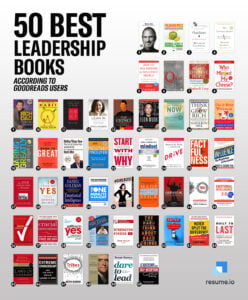
Figuring out what it takes to lead your team effectively can be a real challenge. Good leadership involves understanding how to work to your own strengths, as well as those of the people you’re working with. What works in your context will depend on what you want to achieve, and how you respond to the situations you find yourself in. If you’re looking for guidance on how to become an effective and successful leader, it will help to take some tips from people who are proven experts in leadership matters.
Q1 2020 hedge fund letters, conferences and more
Top Advice From The Best-Rated Leadership Books
Here’s a breakdown of some of the top advice gathered from Goodreads’ 50 best-rated leadership books, by the resume experts at Resume.io.
Have Faith In Yourself:
Many of the expert quotes in the top 50 leadership books emphasize that the quality of a good leader comes from within. According to the psychologist Carol S. Dweck, “The view you adopt of yourself profoundly affects the way you lead your life.” Other writers agree, arguing that having a more positive and self-confident perception of yourself and your own abilities, can help counter the fears and insecurities that could otherwise hold you back.
Learning to accept and understand yourself is the key that will enable you to play to your own strengths, and to stand up and be counted. Facebook’s Sheryl Sandberg argues that “people give up power […] by thinking that they don’t have any.” You can find strength in acknowledging your own vulnerabilities, and because humanity and empathy is at the heart of great leadership.
Strive To Motivate Others:
Leadership hinges on how you work with other people. Just as it pays to know your own strengths and vulnerabilities, it’s also important to understand what motivates people to work with you. Simon Sinek claims that you have two choices: you can either influence human behaviour through manipulation, or inspiration. Of the authors in this list, only Nikolai Machiavelli subscribes to the ‘rule through oppression’ option. The more favourable option to contemporary leadership experts, is the one that appeals to compassion and intrinsic motivation.
If you want to tap into people’s potential, and inspire them to work effectively towards a common goal, it really helps to understand what incentives motivate people to work. Think about building a collaborative culture within your team, in which people have clear goals, and tasks that feel purposeful. Leadership is basically about developing positive and productive relationships that feel satisfying to everyone involved.
Set Clear Goals:
Leadership isn’t about having a position of power for power’s sake. It’s about leading others towards a common purpose. Naturally, this requires having a clear idea of exactly what it is you are trying to achieve, and how your goals might be broken down and delegated effectively. Productivity expert David Allen suggests that in order to get things done, you need to define “what “done” means (outcome) and (2) what “doing” looks like (action).” People work far better when they understand the whys and wherefores of their tasks.
The ability to think ahead is a great asset in a leader. The ancient Chinese military strategist Sun Tzu said “Plan for what is difficult while it is easy, do what is great while it is small.” If you can visualize your challenges, and your successes, in advance, you have a much better chance of developing the best strategy to meet them.
Take A Positive Approach To Opportunity:
There’s a lot of talk about positive thinking and visualizing success in the self-help and leadership genre. It might seem a little ‘new age’ and flighty when it comes to ‘serious’ business, but actually there is some substance to the idea that adjusting your perspective to a more optimistic, ‘can-do’ attitude, can help you be a better leader. After all, if you want to motivate others to achieve a collective goal, it helps to embody that feeling of motivation in yourself.
The fashion entrepreneur Sophia Amoruso says that you have to “create your own opportunities,” because “fortune favours action.” There are practical steps that you can follow to make sure that you ‘seize the day’ and embrace opportunities that you wouldn’t notice otherwise. For Christopher Voss and Tahl Raz, the key is to “consciously label each negative feeling and replace it with positive, compassionate, and solution – based thoughts.” Turn your doubts into opportunities to learn and grow.
Accept Advice:
The final thing to remember is that you are not alone. Fortunately, you can learn from the wisdom of people who understand the challenges and opportunities that make for excellence in leadership. Whether through lived experience or extensive research and analysis, there’s so much help available in your journey to leadership success.
Here’s a compilation of the most popular leadership advice from the 50 best-rated leadership books on Goodreads, courtesy of Resume.io.
The post Great Leadership Advice from Top-Selling Books appeared first on ValueWalk.
